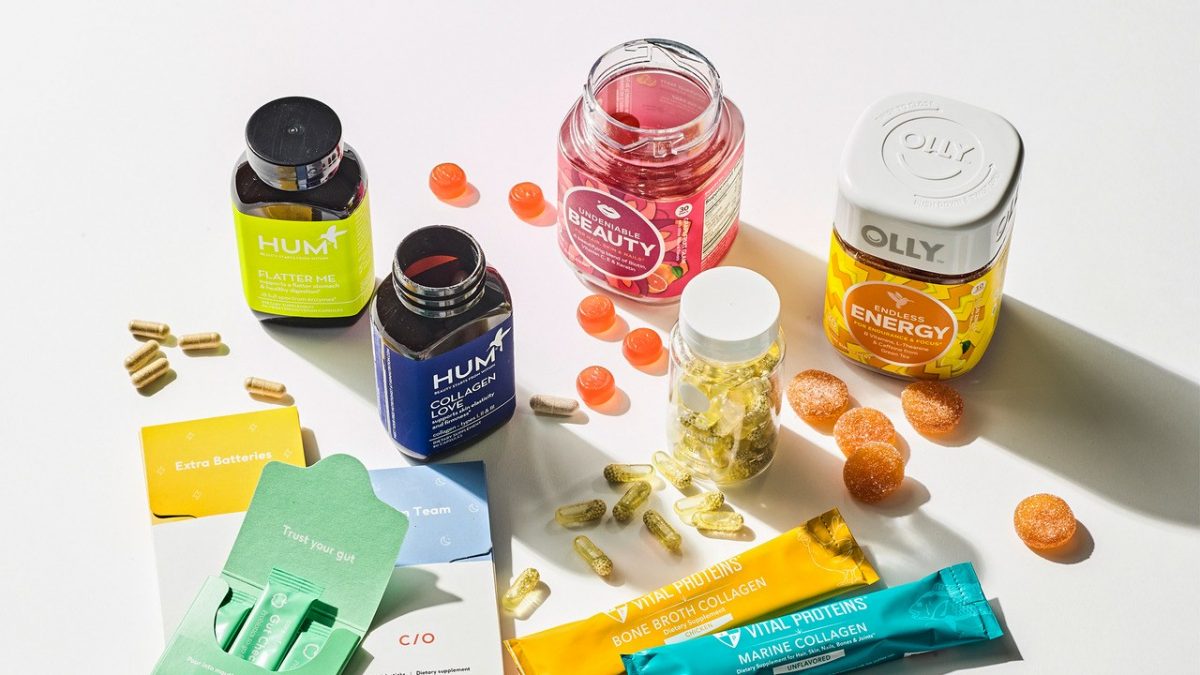We often talk about how the beauty world is constantly evolving. Over the past few years, we’ve watched as influencers taught us how to get a blinding highlight or that perfect Instagram brow. We might have overdone it with those beauty trends because something drastic has happened.
There’s been a sudden shift back to inner beauty. This change came in the form of the wellness movement, and it’s been fascinating to watch an intangible concept like wellness be depicted in viral Instagram photos and sleek new packaging. A few months back we did a deep dive into Instagrammable vitamins, but the wellness movement is far more than just pretty pills.
When you walk into a Sephora, it’s no longer just your favorite foundations and eyeshadow palettes. Now it looks like a pharmacy, with a whole wall devoted to beauty supplements and mysterious powders. But, what are all of these supplements, and will they really make us beautiful? Maybe, maybe not. But we’re here to discuss why the hell Sephora is selling mushroom powders, and what they actually do for us.
A few years ago, Elle wrote about the California-based brand Moon Juice, and the eclectic diet of its founder, Amanda Chantal Bacon. Readers laughed and wondered why someone was eating bee pollen and activated cashews, and using unusual ingredients like cordyceps, reishi, and maca. Four years later and those same ingredients are in popular supplements on beauty counters around the world. Who’s laughing now, readers?! Anyway, many of these strange sounding ingredients are called adaptogens, and they’ve been used around the world for thousands of years.
Only recently have adaptogens been introduced to the mainstream Western world, in part due to people like Amanda Chantal Bacon using them in beauty supplements. Since adaptogens aren’t regulated by the FDA, their efficacy and safety are a little murky, but the idea is that they will adapt to your body’s particular needs. For example, the popular adaptogen ashwagandha may help someone with the jitters calm down but will boost energy someone feeling a little lethargic.
As for the beauty aspect, Moon Juice’s Beauty Dust claims the “adaptogenic blend of super-herbs” can enhance the elasticity of the skin and reduce stress. Positive reviews of the product say it helps with redness and inflammation, and that it can even out skin tone. The catch to adaptogens like this is that they don’t taste great on their own so you have to mix them with smoothies or lattes, and you must use them consistently if you want visible results. A common thought is that products like this might just have a placebo effect on users. Skeptics see it as a waste of money, but if someone is using a product they enjoy and find it to be calming on both the skin and nerves, why not?
Now let’s talk collagen. Collagen is a protein in our bodies that keeps our skin supple and youthful, but as we age it breaks down and causes our skin to look more…meh. For years it’s been added to beauty products and injectables, but now it’s popular in supplement form. People are putting scoops of collagen powder (usually derived from animals) into their morning smoothies with the hope that it’ll strengthen hair and nails while giving their skin a more youthful appearance.
Collagen is known for its many benefits, like improving joint health, but whether or not it gives you baby-smooth, plump skin is still up in the air. The good news is that there is very little risk associated with collagen supplements, and most versions are tasteless, which is a plus for a lot of picky consumers. There are flavored versions, such as the Beauty Collagen line from Vital Proteins, which comes in Tropical Hibiscus, Lavender Lemon, and other flavors to mix into a picture perfect smoothie. If you’d rather take your collagen in pill form, Hum Nutrition has Collagen Love supplements, which also promise better skin elasticity.
It should be clear by now that the only real “beauty” benefits supplements can offer are related to our skin, hair, and nails. Mushroom powders and other hard-to-pronounce ingredients aren’t going to cause any drastic changes in our appearance, but could very well make our skin a little more glowy, and our nails and hair stronger and smoother. The prestige beauty supplement brand The Beauty Chef has the Glow Inner Beauty Powder, which is controversial since it’s a non-FDA approved supplement that costs a whopping $70. One could argue that’s too much to spend on a supplement with no real proof that it works, but at the same time are any of us including 24 organic, bio-fermented and probiotic superfoods into our daily meals? Probably not, so it’s worth a try.
So, why are beauty supplements so popular when we could just eat avocados and tomatoes, which are equally as good for our skin? One answer: we love beauty products! Millennials are consumers and many of us enjoy the marketing, the Instagram photos of collagen smoothies, and the promise of glowing skin. Also, supplements are concentrated so to use a phrase that I hate, you’re getting more bang for your buck. When we buy beauty supplements, we feel that we’re actively making a difference in our skin and health, and it’s a lot more fun than buying a tomato at the grocery store. The wellness movement is in right now, and we want to be a part of something, even if it means putting mushroom powder in our morning latte.


